LoC Ajar
Two Lives, And A Fuzzy Line
Has the earthquake brought the two Kashmirs closer, blurring the LoC? Or is this unity in pain only a mirage? <a > Updates</a>
- Musharraf says every Kashmiri can go to the other side
- Ostensible reason: to unite the families, not to obstruct those wanting to help in relief efforts
- Real reason: to blunt the criticism for turning down India’s help offer
- Advantage: deny India diplomatic points
Anger Against The Army
- It rushed to fortify border defences instead of helping civilians in villages and towns
- Delay in rescue efforts cost many lives
- Not bothered about Kashmiris, so rejected India’s offer of aid. Story may have been different if Punjabis were affected.
- Breakdown of law and order leading to chaos, widespread looting
Goodwill Militants
- All militant groups in PoK hit by the quake
- 2,000-3,000 have died, their assets and camps devastated
- Yet, within hours of the quake, they came out with relief. At many places before the army.
- More disciplined and honest than state aid workers. Base will widen.
You could say it was wild rumour, a poignant attempt at making sense of their terrifying reality. You could argue people in trauma are susceptible to hallucination, what they saw was a chimera. You could blame the incorrigible critics for spreading canards to discredit the government. Or you could laugh and mutter, ordinary people are prone to exaggeration, given to dissimulation, don’t take them too seriously. In fact, you could just go on and on.
But in the verdant valley of Kashmir, near the Line of Control (LoC), in desolate villages and devastated towns, eyewitness accounts swear they are speaking the truth. In the early hours of October 8, after the earthquake measuring 7.6 on the Richter had killed nearly a lakh, the Pakistan army spent the first few crucial days bolstering the border defences. This was why they didn’t go to remote villages, to what were bustling towns, where thousands groaned for help, beseeched for food, clamoured for shelter against dipping mercury and pelting rain. The Pakistan army failed them, they lament.
Reality can get fuzzy for the traumatised, says the director-general, Inter Services Public Services, Gen Shaukat Sultan, to dismiss eyewitness accounts of the army’s indifference to its civilians, to its obsession with security. But truth emerges through Freudian slips. Pakistan president Pervez Musharraf tendered public apology for the army’s delayed response. Shaheen Sehabai, editor, South Asia Tribune, suggests, "Musharraf thought it prudent to apologise for his lapses in order to keep the smoke from turning into a fire."
In Kashmir they are mourning the dead. But they are also mourning the death of their relationship with the government.
They allege the army took care of itself, ignoring the civilians. Ismail Mir and others tried their best to meet Musharraf during his visit to the town of Bagh. But the president had time only visit the garrison where six soldiers had died. "The major in-charge of security told guards to shoot if we tried to enter the garrison," Ismail moans.
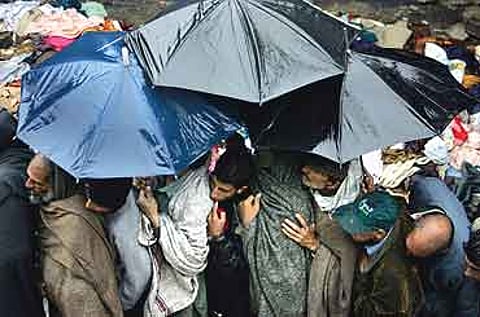
There were others too willing to shoot, in desperation. Outlook’s correspondent in Muzaffarabad witnessed looting in several Kashmiri villages. On his way up into the mountains, in the week of the earthquake, masked youngsters accosted him, brandishing guns. He was not harmed only because he had an armed escort; and because he told the looters he was a Kashmiri journalist. When asked why they had taken to crime, one of the youngsters replied, "We are desperate. Had it not been for the quake, we wouldn’t have been doing this."
>>The Pakistan People’s Party president of Muzaffarabad district, Hanif Awan, told Outlook , "There’s nothing called government out here.Right down from the prime minister (of what India calls PoK), no one is functioning." Indeed, the blame for failing to provide succour to people could be apportioned between the governments in Muzaffarabad and Islamabad. But Sehabai points out, "The only organised institution which can provide relief to the victims in remote areas is the Pakistan army. They will have to receive the acclaim or share the blame, depending on how they conduct the relief operations."
This is the moment of reckoning for Islamabad and the Pakistan army: can it repair its relationship with the part of Kashmir it holds, ripped apart as it is by the earthquake?
In sharp contrast to the Pakistan army, the militants groups demonstrated tremendous alacrity in undertaking rescue operations for the people whose cause they espouse. They, like the army, too had been hit. Almost all major jehadi groups fighting in India’s Kashmir—the Lashkar-e-Toiba, the Jaish-e-Mohammad, the Hizbul Mujahideen, the Tehreekul Mujahideen or Al-Badr—have a presence either in Muzaffarabad or the areas adjoining it in Pakistan’s Kashmir.Their assets had been destroyed; they had to provide medical assistance to the wounded, bury their dead comrades.Estimates of their casualties vary but it can be anywhere between 2,000-3,000.
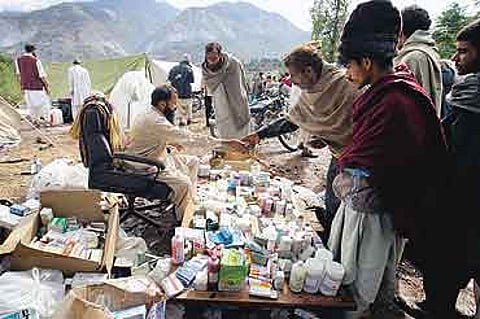
But the militants were out on the streets, irrespective of their own travails. The Jamaat-ud-Dawa (JuD), the parent body of the proscribed Lashkar-e-Toiba, promptly established a large field hospital on a muddy field near the gushing Neelam River, complete with X-ray equipment, a makeshift operating theatre, and even a tent for visiting journalists. The person heading this hospital in Muzaffarabad is orthopaedic surgeon Dr Amir Aziz Khan, who abandoned his Lahore clinic to treat the quake-affected. He had been arrested on Oct 21, 2002, for allegedly assisting Al Qaeda in developing biochemical weapons.
Within hours of the quake, the JuD instantly launched a countrywide campaign to collect relief material and rescue those buried under the debris of collapsed buildings. Yahya Mujahid, the JuD’s central secretary, information, says it’s time to do "jehad of a different nature, by helping people in this hour of need". And JuD’s activists weren’t the only militants who forsook their guns to fan out in Kashmir’s villages and towns. At many places in Pakistan’s Kashmir, people say militants reached them before the army or NGOs did.
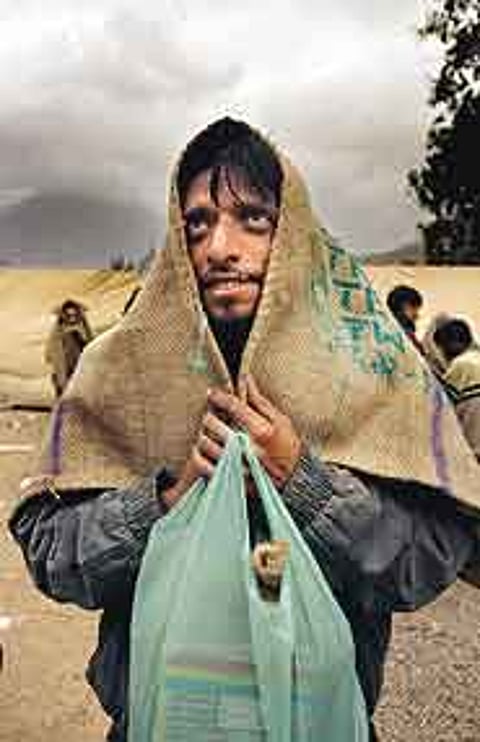
Nadeemur Rehman hails from Karachi; he’s what you can call a terrorist veteran. He has fought in Afghanistan, in India’s Kashmir; he has been through many battles. For him too, providing relief is jehad. "But this time there will be no firing, no bombs exploding, no enemy. This time it’s a race against time as injured people are dying. I have never seen a catastrophe like this in my life," Nadeem declares. Analysts say militant cadres are disciplined and honest, they have a nimble network, in contrast to government relief workers who are corrupt and indolent. And because the government has undermined secular, liberal ngos, it is religious groups who will monopolise the relief work—and the ensuing goodwill.
>The JuD’s relief efforts earned them the instant gratitude of the local government. On Oct 15, ‘Azad’ Kashmir prime minister Sardar Sikandar Hayat met JuD chief Prof Hafiz Mohammad Sayeed; the same day, provincial president Lt Gen (retd) Sardar Mohammad Anwer Khan visited the JuD’s highly efficient medical camps in Muzaffarabad. Talat Masood, a former general and political analyst, sees the jehadi groups being strengthened."They are working on the pattern of Hamas and Hezbollah," he told Outlook."Both Hamas and Hezbollah have given themselves a more humanitarian face to penetrate the masses."
>
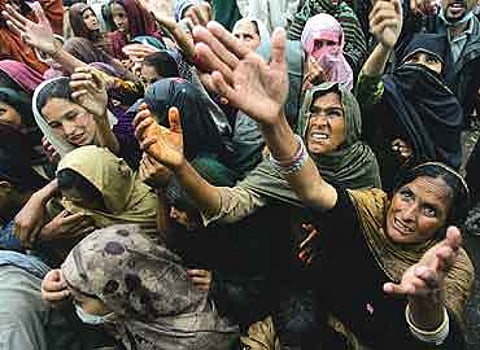
Masood’s analysis is particularly true of the JuD, which following America’s ban on the Lashkar post-9/11, redefined its mission to focus on khidmat-e-khalq, or social welfare.Its 2004 annual report claims it spent Rs 45 million on welfare projects, including a string of seminaries, hospitals and mosques in ‘Azad’ Kashmir.Post-earthquake, the group will have a large catchment area from which it can recruit footsoldiers for the Lashkar fighting in India. This is bad news for India. And it is not good for Pakistan either.
Islamabad has itself to blame for the chaos in these parts, for the flak it has received for its poor response to the quake. It should have accepted India’s offer of assistance in rescue operations, instead of getting swayed by imaginary sensitivities. The J&K Liberation Front (JKLF) says the establishment’s indifference was because it was the Kashmiris (and not Punjabis) who were dying. JKLF leader Shabir Chaudhury issued a statement from London saying, "One wonders why the Indian offer of help was refused, which could have saved hundreds of lives and boosted the confidence between both governments.The answer to this is simple if we take militant camps into equation."
Chaudhury said that despite the Pakistan government’s disavowal, militant training camps continue to function in ‘Azad’ Kashmir, hosting nearly 3,000 militants of variousnationalities. He then said, "What explanation could the Pakistan government give if some militants from Bangladesh, Sudan, Algeria and Egypt were seen in Kashmir? This could have been very embarrassing for the military government of Musharraf." He also said Islamabad could not have allowed Indian helicopters to fly across the LoC because of the fear that ‘dismantled’ militant camps might get sighted.
Chaudhary’s outcry against the Pakistan government isn’t in isolation. Right through the fortnight, the opinion among Kashmiri politicians was near-unanimous: the quake had underscored the irrelevance of the LoC; the two countries should overcome the cartographer’s line and coordinate their activities in providing relief in Kashmir. Critical of the government’s poor response to the quake, the media was dismayed that in such circumstances India’s offer should have been turned down.
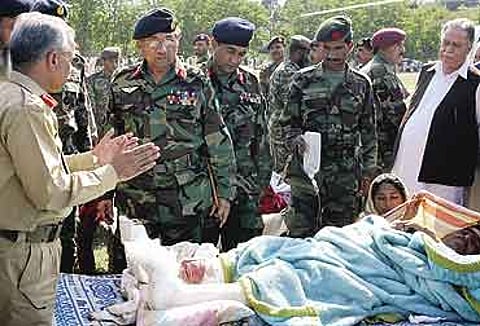
Unable to endure the heat, Musharraf proposed on October 18 the opening of the LoC for every Kashmiri wishing to participate in the relief and reconstruction of Kashmir. He further said he was prepared to consider alternative routes to the badly damaged Srinagar-Muzaffarabad road for the crossing over, and facilitate telecommunication links between the two Kashmirs.
>His statement, in one stroke served to kindle the dream of erasing the LoC, of a seamless Kashmir, of divided families uniting to share grief. The response of Azhar Mehmood, an official in Muzaffarabad’s tax department, was typical: "It would be a fantastic thing. If you are here when they actually allow Kashmiris to cross the LoC, you will see for yourself how important this decision is for the Kashmiri people." Hizbul Mujahideen leader Syed Salahuddin, too, spoke for the people when he said "we welcome this proposal from the depth of our heart. The LoC can never be accepted as a dividing line. India has welcomed this proposal but it will never implement it."
>> But realists even in Pakistan wonder at the government’s seriousness: what Musharraf had announced was a statement of intent; the proposals haven’t even been formulated.Wasn’t he just buying time, hoping to dissipate the popular sentiment against the LoC? JKLF’s leader Amanullah Khan thought Musharraf’s announcements were meaningless."The decision on the LoC is just a sugar-coated pill.People are playing politics while hundreds are dying around them." He too believes India’s assistance should have been accepted.
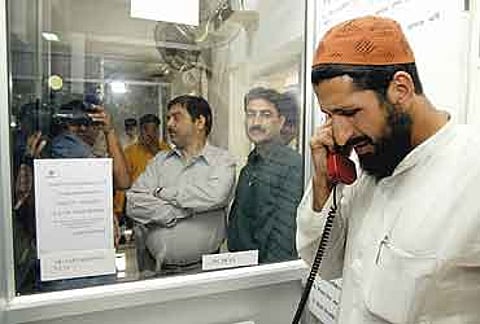
Dr Shireen Mazari, director-general, Institute of Strategic Studies, is considered close to the establishment.And she thinks Pakistan’s Kashmir policy will be "inward-looking", for rebuilding Kashmir from scratch."The search for a solution will continue but the dynamics will not change," she told Outlook. "The LoC is in reality a ceasefire line; we have to understand that there are militaries on both sides. We should create a humanitarian regime for crossing the LoC. But neither India nor Pakistan will allow unfettered travel."
That may sound defeatist. But wait till you listen to journalist and author Ahmed Rashid. He says the physical devastation of Kashmir has ensured that status quo ante can’t be restored. "Nobody can oppose a settlement that helps the Kashmiris get back on their feet. This could encourage western donors to help rebuild this region as a modern, dynamic part of the subcontinent that could set an example for the rest of India and Pakistan.Instead of firing over the shoulders of Kashmiris, the two countries have the chance to really helpthem. Musharraf and Manmohan Singh have no other choice. The past is another country."
Others feel the quake should prompt both India and Pakistan to look afresh on Kashmir. Dawn’s senior editor Zubeida Mustafa points out, "This is the time for testing the waters on twocounts. How far can India go on Kashmir? How much leeway Pakistan’s own public opinion would allow it on Kashmir?" She, like many others, feels this is the time for the two nations to moot unconventional measures. Build a future from the rubble of the past. Is it too much to ask of politicians?
By Mariana Baabar in Islamabad, Amir Mir in Lahore and Raja Asghar in Muzaffarabad
Tags